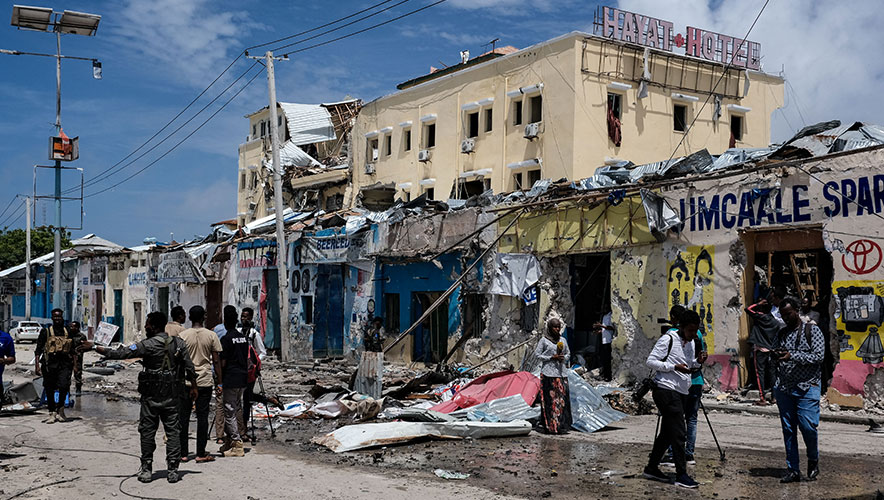Al-Shabab Extremists Attack Hotel in Somalia
Al-Shabab militants stormed a hotel in Mogadishu, Somalia, on 19 August, which led to a 30 hour-long siege and firefight with security forces. The assailants used car bombs to enter the Hayat Hotel and then violently took control of the site. Twenty-one people are confirmed to have died in the attack, and 106 people were trapped inside the hotel during the ordeal, the BBC reported.
Somali security forces retook the hotel on Saturday night, but they were forced to rescue people one by one and in small groups. It is possible that the death toll could increase because some family members collected the bodies of relatives before an official count was made. According to Somalia’s Health Minister Ali Haji Adan, 117 people were injured and 15 are in critical condition.
The hotel—a popular location for federal government employees to meet—was largely destroyed after the intense fighting between militants and security forces. Security forces struggled to reach upper floors and hostages there during the fight because the gunmen had reportedly bombed out the staircases needed for access, the BBC said. The attackers were shot and killed during the military operation to end the siege, Al Jazeera reported. The exact number of attackers is still unclear.
Al-Shabab, an Islamic extremist group with ties to al Qaeda, claimed responsibility for the attack. It remains the most lethal Islamic extremist group in Africa, the Associated Press (AP) reported. Al-Shabab has been fighting for more than a decade to topple the Somali government and establish its own rule based on a strict interpretation of Islamic law, according to Al Jazeera.
“The group has seized even more territory in recent years, taking advantage of rifts among Somali security personnel, as well as disagreements between the government seat in Mogadishu and regional states. It remains the biggest threat to political stability in the volatile Horn of Africa nation,” the AP said. “Forced to retreat from Mogadishu in 2011, al-Shabab is slowly making a comeback from the rural areas to which it retreated, defying the presence of African Union peacekeepers, as well as U.S. drone strikes targeting its fighters.”
Al-Shabab has capitalized on political instability in the region for years, and it used propaganda in 2020 and 2021 to spread disinformation about COVID-19 and Western influences, according to a Europol report released earlier in 2022.
The Islamic State (IS) did not claim responsibility for any terror attacks on European Union soil in 2021, but its supporters did capitalize on violent incidents to promote the IS cause, according to a new Europol report. https://t.co/5ekuqc6KaA
— Security Management (@SecMgmtMag) May 27, 2022
Hotels are a frequent target for al-Shabab in Somalia because that’s where many government officials congregate and hold meetings, said Omar Mahmood, senior analyst for Eastern Africa at the International Crisis Group, in an interview with Al Jazeera.
“But there’s also often a secondary element to some of these attacks,” he added. “Al-Shabab runs a very extensive extortion racket within Mogadishu itself. And they target business owners that haven’t complied [with their demands].”
While al-Shabab is an affiliate of al Qaeda, it has shifted tactics to operate more locally and independently.
“Today, the main threat posed by the al Qaeda pole of the jihadist movement outside of its primary areas of operation stems from grassroots jihadists who think globally but act locally, posing a far larger threat to the institutions and people of the countries its franchise groups are based in than to the West," according to Scott Stewart, vice president of intelligence at TorchStone Global
“In places like Somalia and Mali, al Qaeda franchise groups operate as insurgents that exert influence and control over large expanses of territory and the population that lives there,” he wrote for Security Management in 2021. “They attack the military and government to make their areas of operation ungovernable and thus more susceptible to their influence. They also seek to undercut anything that promotes stability or provides tax revenue to the government, so they attack business interests, tourist sites, and NGOs.
“These groups also pose a persistent terrorist threat to the regions surrounding their primary areas of operation,” Stewart added.
The attack in Somalia comes at a time of political uncertainty in the country and the region. Somalia elected a new president this year, Hassan Sheikh Mohamud, and his security agenda is targeting al-Shabab, leaving them frazzled and on edge.
“They are really trying to strike in ways that have not yet been seen to show that they are an organization to reckon with,” Somalia analyst Hodan Ali told Al Jazeera. “What we’ve seen in the last couple of weeks shows Shabab has the capability and the wherewithal to execute these attacks, both within Somalia and in the border areas.”
Somali forces have ended a 30-hour siege of a hotel in the country's capital, Mogadishu, according to military officials https://t.co/06mczETifd pic.twitter.com/sOsay01JUH
— Al Jazeera English (@AJEnglish) August 21, 2022
“What is really baffling is that they are able to carry out these multiple attacks so successfully,” he continued. “It is something the security sector of Somalia needs to deal with, and also it’s a regional threat. Shabab is not just a Somali problem, it’s a regional problem. It is a global organization.”
